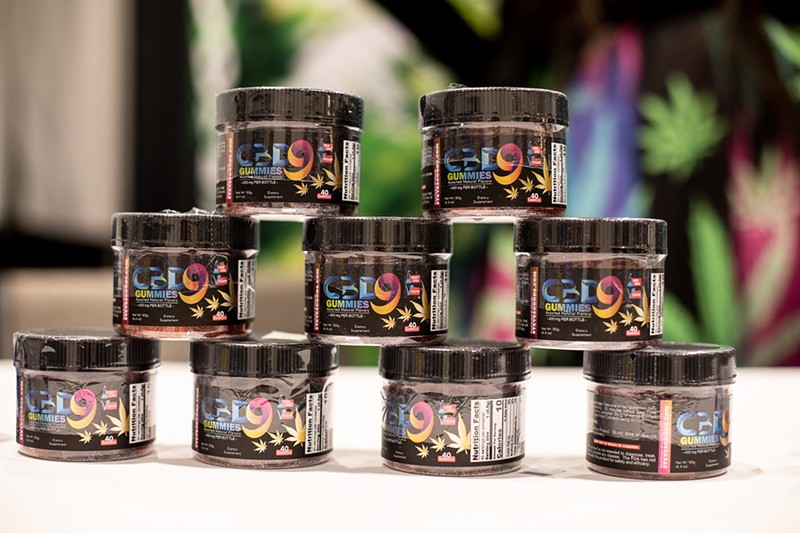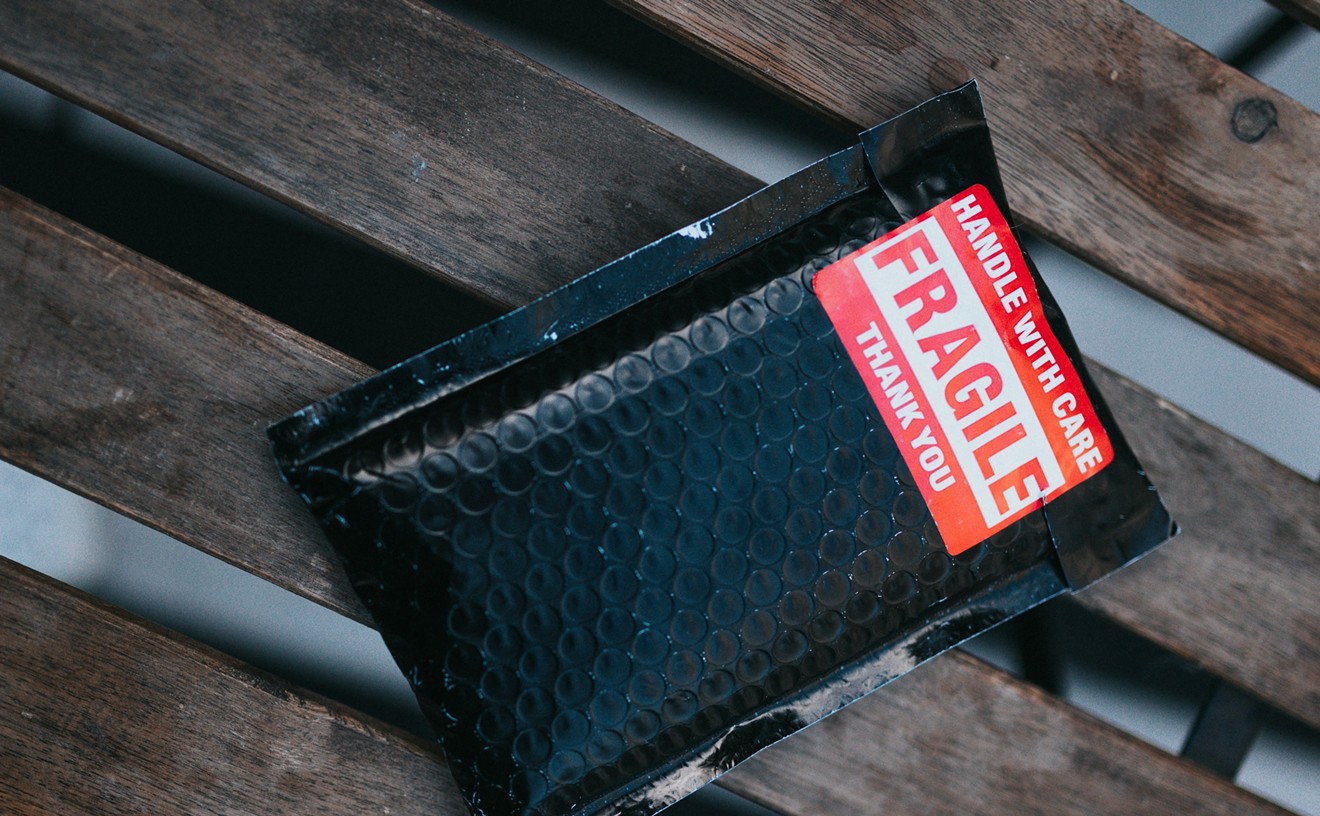Governor Jared Polis has signed a bill aimed at restricting intoxicating hemp products, and some stakeholders in Colorado's hemp industry are calling foul.
Although hemp and marijuana are both cannabis plants, they differ in one key way: THC. If a hemp plant's flowers or a final hemp product tests above 0.3 percent THC, it is considered marijuana by the federal government. That line has become hazy over the past several years, however.
A variety of hemp plants have been selectively bred to produce low amounts of THC and high amounts of CBD, a non-intoxicating cannabinoid with medical benefits — but CBD can be easily modified into different isomers of THC, including forms that aren't banned by the federal government. That loophole has led to forms of THC like Delta-8, Delta-9 and Delta-10 THC, which are technically derived from hemp and able to exist without federal enforcement. Since that development, THC gummies and vape cartridges that get people high in a manner similar to marijuana have boomed in popularity.
Congress legalized industrial hemp in 2018, roughly one year before intoxicating hemp products debuted on a commercial level. Ever since, these modified and synthetic forms of THC have been available for purchase online without proof of age, and at gas stations and other retailers. The federal government hasn't enforced actions against the vast majority of this new industry, with a federal court ruling in favor of the legality of hemp-derived THC.
But in the absence of federal enforcement, concerns regarding youth access have surfaced, and Colorado business regulators and lawmakers have taken on the responsibility for dealing with them.
Sponsored by senators Dylan Roberts and Kevin Van Winkle and state representatives Marc Snyder and Chris deGruy Kennedy, Senate Bill 23-271 was pushed by the Colorado Department of Revenue, which oversees the state's regulated marijuana industry. Polis, who signed the bill on June 7, was "excited to see Colorado remain proactive and continue to lead on progressive cannabis-related policies," according to his deputy press secretary, Melissa Dworkin.
Now that Polis has signed the bill, Colorado will ban the sale of intoxicating hemp products online and outside of licensed dispensaries while also limiting the sale of hemp-derived THC products that could be considered non-intoxicating. Although intoxicating hemp sales are now severely restricted in Colorado, companies can continue operating through a safe-harbor provision, as long as their products are shipped to other states where synthetic THC is legal or unregulated.
Hemp companies that don't make intoxicating products agree with the bill's desire to keep those products away from children, but argue that they're now getting hit with legal shrapnel that could harm their ability to reach consumers and medically compromised customers.
Sasha Kalcheff-Korn is the executive director of Realm of Caring, a Colorado nonprofit that provides education and resources for medical marijuana patients and their families. Realm of Caring routinely works with child patients, many of whom depend on high-CBD, low-THC products made from hemp, such as sublingual tinctures and pills. Most of these products are currently sold online or at retailers across the country, including grocery stores and health-food markets, but Kalcheff-Korn worries that Senate Bill 271 will hamper that access in Colorado and eventually force hemp-derived medications into marijuana dispensaries.
The new law limits hemp products to 1.25 milligrams of THC per serving, with restrictions on serving size, age, labeling and packaging for anything higher than a 20-to-1 ratio of CBD to THC, as well. Hemp products that are deemed non-intoxicating under SB 271 will continue to be regulated by the state Department of Public Health and Environment.
Kalcheff-Korn and a coalition of hemp companies and industry organizations argue that the new rules will scare traditional retailers away from CBD products, whether they contain THC or not — and, more important, she says, people who need access to non-intoxicating products with THC could face more challenges.
"Some of the [hemp] companies we work with would have to reformulate and bring down their THC limits. It might make some of them have to dilute their products so they can make those ratios. Some might have to shut down production because they can't afford to reformulate or repackage their products," Kalcheff-Korn notes. "And, in a broader sense, it opens the door for further regulation to come down the pipeline."
Kalcheff-Korn was part of a twenty-person state task force assigned to study intoxicating hemp and recommend regulatory changes. That task force, created by a 2022 bill, suggested tighter restrictions for synthetic THC made from hemp, but pushed back on the notion of coming down on products with low amounts of naturally derived THC.
For SB 271's first hearing, around "90 percent of the task force showed up in support" of the extensive report submitted to the legislature, but lawmakers "didn't listen to their suggestions at all," Kalcheff-Korn says. She and other industrial hemp industry members believe they were cut out of the conversation, and that special interest groups from the marijuana and CBD industries took over the bill.
"Going into that first Senate Finance Committee hearing, there was a lot of unity amongst the task group," Kalcheff-Korn recalls. "It was a little bit of a shock to see that the sponsors presented all of these amendments that were happening while we were just sitting in the room. When we went in there, we expected maybe three amendments, but they were already on amendment number seven by the time we sat down."
The task force suggested a serving-size limit of 2.5 milligrams of THC, but when SB 271 was introduced, the serving size was quickly changed to 1.75 milligrams. By the end of the bill's run, over thirty amendments had passed, and the THC serving size was 1.25 milligrams.
Although THC is intoxicating, medical marijuana patients and advocates say a little THC is necessary to get the full medical impact of CBD, CBN or other beneficial cannabinoids. This cannabis impact, dubbed the "entourage effect," was largely accepted by lawmakers, but they feared that 2.5 milligrams was too much after anti-marijuana groups and factions of the marijuana industry pushed back.
"We know there is a way to administer products with THC so people are not getting high. The point is to feel normal, and not medicated," Kalcheff-Korn adds. But by adhering to the new laws, "these would no longer be the same products, and that puts danger on the horizon."
Hunter Buffington, director of hemp farming trade group Agriculture Policy Solutions, echoes those sentiments, but says that the bill's THC ratio rules also apply to whole plants and extractions, which could affect farmers and breeders who don't perform their own extractions and reformulations to meet the new standards. According to Buffington, around 20 percent of whole-plant extractions in Colorado will have to be reformulated.
"They're not pulling everything apart and then manufacturing it into a specific formulation. Many of them have their own genetics, and they pride themselves on having a whole-plant product. They're not interested in synthetics," she says. "People who are already manufacturing a formulation are better equipped, whereas vertically integrated farmers don't have the resources to change their labeling for Colorado. These are going to be huge label changes."
Roberts's office did not respond to requests for comment, and Van Winkle's office declined. Snyder and deGruy Kennedy said the Department of Revenue asked them to sponsor the bill and they stand by their decisions, but they're already worried about its impact on Colorado's hemp space and SB 271's safe-harbor provision.
"I told my colleagues that this might get complicated and there might be ten amendments coming, but don't lose sight of the fact that these are the products we want out of Colorado and out of the hands of Colorado kids," Snyder details. "Frankly, I had some concerns and trepidation about the smaller serving size and the safe harbor. When I first saw that, I said, 'Wait a minute, we're going to outlaw these products or prohibit them for people under 21 in Colorado, but we're going to ship them to other states and create a problem for them?'"
Snyder ultimately agreed that the bill needed to be passed despite its problems. So did deGruy Kennedy — whose amendment took the serving size limit down to 1.25 milligrams. However, deGruy Kennedy says he "wasn't a key player" in the bill discussion, and adds that he only introduced the amendment as a compromise to avoid an even stricter limit of 0.5 milligrams suggested by state representative Judy Amabile.
"The DOR and their executive director really led the process from this point forward. We needed to figure out a way to get this in a shape that the governor would sign. Everyone recognized that we needed to get a bill passed," he adds. "To be honest with you, I have laid awake at night thinking about this. I have friends who are lobbyists for hemp groups telling me this will destroy the hemp industry."
Not all of the hemp industry opposed the bill, however. Companies built around hemp and CBD extraction, such as Charlotte's Web, eventually came around on it after concessions were made for tinctures and post-harvest processing. And the measure was supported by two unlikely allies: the marijuana industry and the anti-pot lobby.
Colorado marijuana trade organizations such as Colorado Leads, the Colorado Springs Cannabis Association and the Marijuana Industry Group all pushed for SB 271's passage, as did groups that annually lobby for restrictions on retail marijuana, including Blue Rising Together and One Chance to Grow Up. Both sides argued that restrictions on intoxicating hemp products were essential to protect kids, but hemp industry members on the state task force believe that some of their pot industry counterparts are doing it for business reasons, too.
"There is a portion of the marijuana industry that stood by making recommendations based in science. They're worried about synthetically derived products, and not hemp. But I think some of the marijuana industry did a huge disservice in how far we've come in eradicating this stigma and prohibition. Now they're essentially saying all THC is bad, but don't worry, because they'll regulate it for you," Kalcheff-Korn laments.
Although factions of the pot industry supported the bill overall, they "were doing the best to understand and stay on top of the different amendments" just like everyone else, according to Marijuana Industry Group executive director Truman Bradley.
"The hemp task force did a great job, but it's not infallible," says Bradley, a task force member who wrote a dissenting opinion on its final recommendations. "This is an incredibly complex issue, and the bill itself is very technical. I think it's a critical and crucial first step to regulating intoxicating hemp products, which were wholly unregulated before this bill."
Pointing to the safe-harbor provision that allows intoxicating hemp products to be made in Colorado and shipped elsewhere, Buffington says she takes issue with the notion that SB 271 was only passed to protect kids.
"The number of times I've heard rhetoric about saving the children and that the goal was to regulate and control the synthetic intoxicating cannabinoids — instead, what we did was sacrifice the whole plant industry in Colorado," she argues. "No one is regulating synthetic products. They're not being regulated in the states they're sent to, and Colorado isn't regulating their production in their origin state, either."

Audio By Carbonatix
[
{
"name": "Air - MediumRectangle - Inline Content - Mobile Display Size",
"component": "12017618",
"insertPoint": "2",
"requiredCountToDisplay": "2",
"watchElement": ".fdn-content-body",
"astAdList": [
{
"adType": "rectangle",
"displayTargets": "mobile"
}
]
},{
"name": "Editor Picks",
"component": "17242653",
"insertPoint": "4",
"requiredCountToDisplay": "1",
"watchElement": ".fdn-content-body",
"astAdList": [
{
"adType": "rectangleLeft",
"displayTargets": "desktop|tablet"
},{
"adType": "rectangleRight",
"displayTargets": "desktop|tablet|mobile"
}
]
},{
"name": "Inline Links",
"component": "18838239",
"insertPoint": "8th",
"startingPoint": 8,
"requiredCountToDisplay": "7",
"maxInsertions": 25
},{
"name": "Air - MediumRectangle - Combo - Inline Content",
"component": "17261320",
"insertPoint": "8th",
"startingPoint": 8,
"requiredCountToDisplay": "7",
"maxInsertions": 25,
"watchElement": ".fdn-content-body",
"astAdList": [
{
"adType": "rectangleLeft",
"displayTargets": "desktop|tablet"
},{
"adType": "rectangleRight",
"displayTargets": "desktop|tablet|mobile"
}
]
},{
"name": "Inline Links",
"component": "18838239",
"insertPoint": "8th",
"startingPoint": 12,
"requiredCountToDisplay": "11",
"maxInsertions": 25
},{
"name": "Air - Leaderboard Tower - Combo - Inline Content",
"component": "17261321",
"insertPoint": "8th",
"startingPoint": 12,
"requiredCountToDisplay": "11",
"maxInsertions": 25,
"watchElement": ".fdn-content-body",
"astAdList": [
{
"adType": "leaderboardInlineContent",
"displayTargets": "desktop|tablet"
},{
"adType": "tower",
"displayTargets": "mobile"
}
]
}
]












